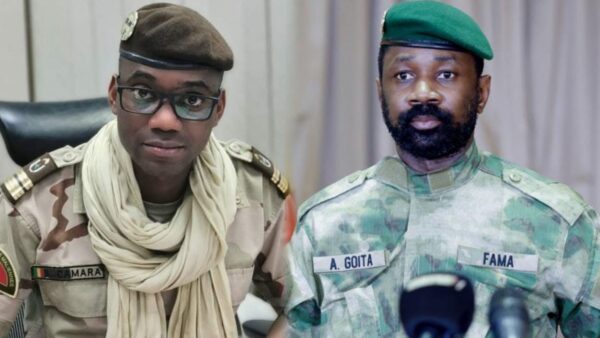Between Colonel Assimi Goïta, president of the Malian transition, and his Minister of Defense, General Sadio Camara, the simmering war is now out in the open. The two men, once allies in the coups d’état of August 2020 and May 2021, are now watching each other with barely concealed hostility.
The night of the generals
On the night of August 10-11, 2025, the National Guard – Sadio Camara’s original corps – was struck at its core: General Abass Dembélé, a respected figure of the Malian Armed Forces (FAMa), former zone commander in the North, governor of Mopti, wounded in the front at Konna in 2013, and known for arresting the coup leader Amadou Sanogo that same year, was arrested. Alongside him, Brigadier General Nema Sagara, from the air force, close to General Ismaël Wagué (Minister of National Reconciliation), was also apprehended.
These two arrests are not isolated incidents. They are part of a broader wave, targeting both military personnel and civilians deemed “troublesome.” In the crosshairs: anything resembling a counter-power to the Koulouba palace.
The circle of suspicion
Those close to Sadio Camara feel the noose tightening. Observers speak of a methodical neutralization operation. Malick Diaw, president of the National Transition Council (CNT), a former companion of Goïta, is under pressure to clarify his alignment. Modibo Koné, head of intelligence services known for his cross-cutting networks, is keeping a close eye on the situation.
Behind the scenes, Ismaël Wagué is keeping a low profile. Officially in charge of National Reconciliation, he knows that his origins in the air force and his connections with Nema Sagara place him in a precarious balance.
The political clean-up
Civilians are not spared. Choguel Kokalla Maïga, former Prime Minister and former pillar of the June 5 Movement/Rally of Patriotic Forces (M5-RFP), has been taken into custody, accused of mismanagement of public property based on a report from the Auditor General. His lawyer, Cheick Oumar Konaré, denounces a political maneuver. Moussa Mara, another former head of government, is already behind bars.
Current Prime Minister General Abdoulaye Maïga remains silent, but his positioning is being scrutinized: a staunch loyalist of Assimi Goïta, he knows he could become the figurehead of a recentralized and locked-down executive.
A worrying military agenda
Meanwhile, President Goïta has announced the massive recruitment of 124,000 soldiers, officially to strengthen the fight against jihadism. His critics see it as the construction of a tailor-made parallel force, beyond the control of Sadio Camara and the traditional military staff. The “Operation Dougoukoloko 2025-2030,” meant to extend Operation Maliko, is seen by some as a smokescreen.
The most virulent critics speak of a “febrile” president, determined to neutralize any dissent within the military. Social media is abuzz: Pinky Alby (@Albypinky) accuses the generals of “jumping with the terrorists”; Séga Diarrah (@Segadiarrah) defends Abass Dembélé, “trained in France and the United States,” and warns of “a purge that destroys the republican backbone of the army.” Mark Abubakari (@MarkA4967) warns of the “growing influence of Russian mercenaries,” accused of abuses.
The AES backdrop
In this tense climate, the Alliance of the Sahel States (AES) – Mali, Burkina Faso, Niger – is going through a rough patch: economic difficulties, social unrest, jihadist pressures (the attack on Foutouri is still fresh in everyone’s minds). Cracks are appearing in the solidarity of the juntas. In Niamey, Abdourahamane Tiani is playing his own hand. In Ouagadougou, Ibrahim Traoré remains attentive to the turmoil in Bamako.
At this stage, Assimi Goïta’s gamble, acclaimed by some internally and elsewhere for his “sovereignty,” is clear: lock down, expand, intimidate. But in a fragmented Mali, where loyalties are shifting and grudges are lasting, purges often have a boomerang effect.
Internal note: several military sources already mention, off the record, the existence of “lists” of personalities to be arrested or removed, involving military, political, and even some economic partners. The atmosphere dangerously recalls the prelude to the ruptures of 2012-2013.


